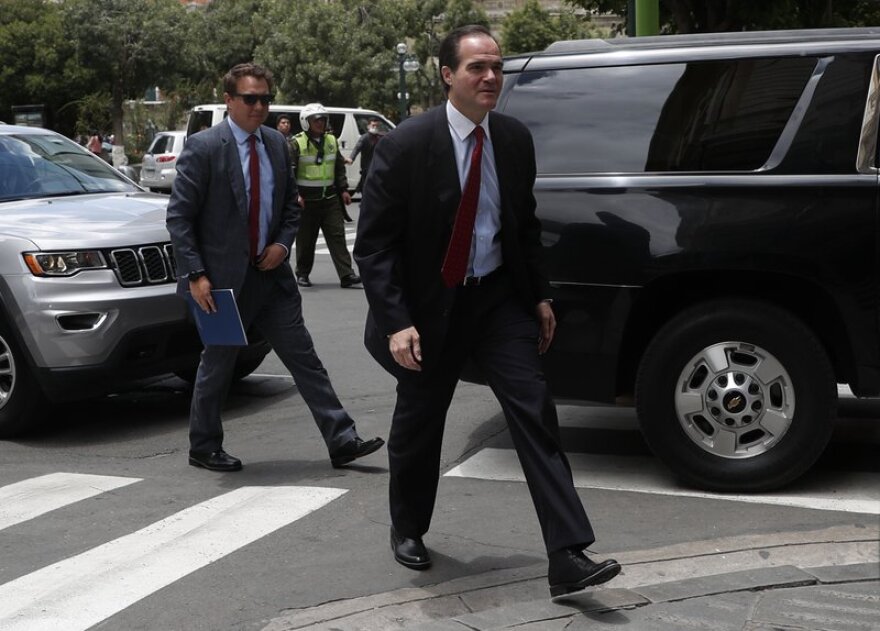COMMENTARY
Tuesday night the Trump Administration made the surprising if not stunning announcement that, for the first time ever, the U.S. is nominating an American to head the Inter-American Development Bank (IDB). For many if not most Latin American and Caribbean governments, the news was more jarring than hearing a gringo tourist order dinner in Spanish.
WLRN is committed to providing the trusted news and local reporting you rely on. Please keep WLRN strong with your support today. Donate now. Thank you.
Would Mauricio Claver-Carone, now President Trump’s top Latin America adviser, undermine the IDB’s mission if he were to become its president – as more than a few hemispheric diplomats are convinced? Or might having an American like him at the helm strengthen the region’s most important development financing organization?
That depends on which Mauricio Claver-Carone we’re talking about.
Between now and September, when the board of the Washington D.C.-based IDB makes its selection to replace outgoing President Luis Alberto Moreno, the region will be – and should be – weighing those two Claver-Carones like cuts of matambre at an Argentine meat counter.
READ MORE: Does COVID Aid to Latin America Reflect Chinese Expansion - and U.S. Decline?
At first glance it’s understandable that Latin American officials would recoil at the idea of Claver-Carone taking the IDB’s reins. For starters, since the IDB was founded six decades ago there’s been a tacit deal between Washington and the rest of the hemisphere that Latin American or Caribbean figures would run it – especially since the bulk of its lending is done on their turf.
“For a hemispheric protocol to suddenly be broken like that makes most Latin American and Caribbean governments worry about ulterior motives on the part of the Trump Administration,” one South American diplomat told me.
Would Claver-Carone twist the IDB into a punitive financial arm of Miami's anti-Castro crusade? Or make it America's effective answer to China's mushrooming largesse in this hemisphere?
And what’s the hidden design they fear most? That Trump and Claver-Carone – frustrated so far in their efforts to topple the disastrously dictatorial leftist regimes in Venezuela, Cuba and Nicaragua, aka the “troika tyranny” – will use IDB loans as tools of leverage against countries that don’t endorse the U.S.’s hemispheric platform as enthusiastically as they should.
That’s an especially worrisome prospect since most Latin American and Caribbean countries stand to be economically ravaged after the COVID-19 pandemic subsides. Claver-Carone says a big reason he wants to lead the IDB is to help them recover. But a big concern is that they’ll be all the more vulnerable to his political leverage; they’ll fear punishment by an IDB under his yanqui control. They’re already aware, for example, of how brazenly Trump withheld aid to Central American governments until they bowed and scraped to his anti-immigration crusade.
Diplomats as well as former IDB officials tell me they’re also concerned about Claver-Carone’s often abrasive Cuba obsession. They say the right-wing Cuban-American lawyer is notorious for viewing every Latin American and Caribbean issue through the prism of his overarching policy goal: the fall of Cuban communism.
PARTISAN EXTORTION
That’s not a bad desire per se, but transferring that single-mindedness from White House policy-making to IDB loan-making would set a bad precedent. Previous IDB presidents have certainly politicized the bank to a degree; they haven’t, however, twisted it into a punitive financial arm of Miami’s anti-Castro agenda.
But there is a second Claver-Carone to consider. One who, if he can drop the Cuba-centrism, could be an effective IDB boss.

That would be the Claver-Carone who helped create the Trump Administration’s América Crece, or Growth in the Americas program. América Crece was launched last December as the U.S.’s answer (finally) to the development infrastructure projects China has been lavishing on Latin America for most of this century. And it may – may – be a welcome acknowledgement by Claver-Carone that the way to win the region over to his Cuba-busting drive is via development aid that isn’t partisan extortion.
One hopes Claver-Carone learned realities like that when he was the U.S.’s representative to the International Monetary Fund (IMF) or when he helped craft legislation two years ago that created the U.S. International Development Finance Corporation.
Claver-Carone has pledged to serve only one, five-year IDB term – and he claims to have the backing of Brazil, which would be significant. Most important, he says, his presidency would prove to Latin America that, contrary to its past complaints, the U.S. does care about the IDB.
Problem is, Latin America is wondering why the U.S. suddenly cares so much about the IDB. And they’re trying to figure out which Claver-Carone has the real answer.






